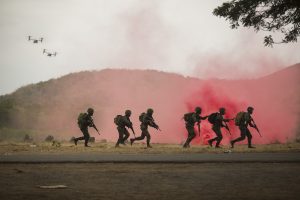The United States will send its largest contingent to this year’s Cobra Gold military exercise in Thailand, officials from the two countries announced yesterday, as the two countries mark the 190th anniversary of diplomatic relations.
Officials from Thailand and the U.S. told reporters yesterday that after several years of COVID-19-related impacts and soured relations following Thailand’s 2014 coup d’etat, Cobra Gold Exercise 2023 will be back to full strength this year, with 7,394 troops from 30 countries slated to participate as exercise partners or observers.
The upcoming exercise, the 42nd iteration of Cobra Gold to be held since 1982, will take place between February 27 and March 10 in the Thai provinces of Lopburi, Chanthaburi, Sa Kaeo, and Rayong. Col. Kurt Leffler, the U.S. defense attaché in Thailand and chief of the Joint U.S. Military Advisory Group, said that more than 6,000 U.S. personnel would be sent to participate in the event, “the largest U.S. participation in Cobra Gold in a decade,” according to a report by BenarNews. Last year’s exercises featured less than 3,500 participants, including less than 1,300 from the U.S.
This year’s exercises will involve a field training exercise and command post exercise, as well as training in cyber warfare, humanitarian assistance, disaster response, and – for the first time – space operations. As is customary, seven nations – Thailand, the U.S., Singapore, Japan, Indonesia, South Korea, and Malaysia – will participate in the main war exercises, while three others – China, Australia, and India – will take part in humanitarian aid exercises. The remainder will merely take part as observers.
Cobra Gold Exercise 2023 comes at a time of increasing geopolitical uncertainty, due to the Russia-Ukraine war and growing U.S.-China tensions, particularly over the South China Sea and Taiwan. It also coincides with the 190th anniversary of diplomatic relations between Thailand and the U.S., which find the countries’ alliance improving, but largely stagnant to past eras of history.
One of the reasons for the recent reduction in the U.S. presence at the annual Cobra Gold exercises was Thailand’s coup, which triggered an automatic downgrading of U.S. security ties with the country. The United States scaled down its participation in Cobra Gold 2015, sending 3,600 troops to the exercise compared to 4,300 in 2014. A similar number participated in 2016.
In the end, the holding of elections in 2019, which ended the period of open military rule (though it did so strictly on the military’s terms) paved the way for the restoration of the U.S. security engagement with Thailand, even if certain tensions in the relationship remain. “We’ve certainly returned to a ‘Cobra Gold of Old’ in terms of scale,” Leffler said yesterday. “In terms of scope … the quantity and complexity of exercise events, this Cobra Gold will surpass what has come before.”
The bolstered U.S. contingent continues a broad stiffening of the U.S. security posture across Southeast Asia, which is designed to counter and deter Chinese power. Last year, the U.S. and the Philippines, Washington’s other treaty ally in Southeast Asia, held what the two sides described as the largest-ever iteration of the Balikatan military exercises, which involved nearly 9,000 navy, marines, air force, and army personnel, including 5,100 U.S. soldiers.
This has been followed by a rapid advancement of the security relationship under President Ferdinand Marcos Jr., who earlier this month expanded U.S. access to military facilities in the Philippines under the 2014 Enhanced Defense Cooperation Agreement. While Thailand will not embrace the U.S. military with such alacrity, and suspicions persist in Washington about how committed Thailand is to the countries’ alliance given its close economic relationship with China, the bolstered U.S. contingent points to a relative improvement in the U.S.-Thai relationship after a difficult decade.

































